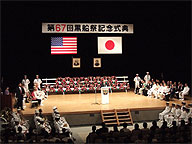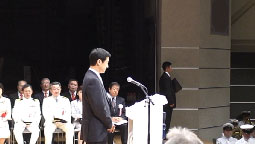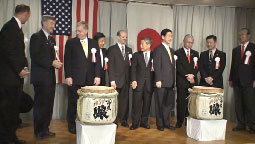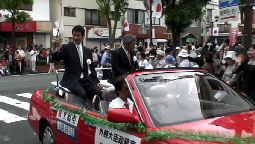Message of Vice-Minister for Foreign Affairs Shintaro Ito
on the Occasion of the 67th Black Ship Festival




May 20, 2006
Vice-Governor Suzuki, Mayor Ishii, His Excellency Ambassador Schieffer, distinguished guests, Ladies and Gentlemen:
I wish to extend a few words of congratulation on the occasion of the 67th Black Ship Festival.
With the conclusion of the Treaty of Peace and Amity in March 1854, Shimoda City became the first port in Japan opened by the Treaty. The city served as the gateway to the western world and the starting point of Japan's modernization.
The supplementary Shimoda Treaty allowed foreign nationals to stay freely in the city. Around Shimoda, exchanges flourished, marking an historic departure from Japan's national isolation.
It is said that the Americans, including Commodore Perry, were impressed with the European-style layout of Shimoda City, the picturesque landscape of Shimoda Bay, and the hospitable nature of Shimoda's people.
Over one hundred and fifty years have passed since the conclusion of the Treaty of Peace and Amity. Japan-US exchanges initially began between Commodore Perry's party of 1,265 Americans and the citizens of Shimoda. Today about 5.4 million Japanese visit the United States and about 800,000 Americans visit Japan each year. Japan and the United States, sharing common values and interests, are tackling a wide range of international issues. Still, people-to-people exchanges form the foundation of our close partnership.
This annual Black Ship Festival is a truly significant event. It offers us an opportunity to recall the commencement of Japan-US relations and to recognize once again the importance of people-to-people exchanges, in building ever closer amity between our two nations.
May I take this opportunity express my great respect for the efforts of Mayor Ishii, his staff and the citizens of Shimoda and wish a great success for the 67th Black Ship Festival. Furthermore, I should like to wish the City of Shimoda continued prosperity.
Shintaro Ito
Vice-Minister for Foreign Affairs
Back to Index
